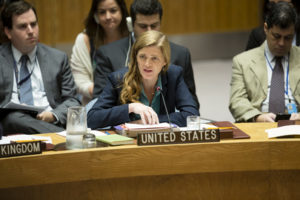Official Washington’s dominant neocons have pushed emotional propaganda about Syria as a way to justify a “regime change” project there and are now furious with its apparent failure, as ex-CIA analyst Paul R. Pillar explains.
By Paul R. Pillar
Among large-scale tragedies involving human suffering and the many examples of man’s inhumanity toward man, only a few capture our imaginations and sway our collective emotions. The question of which specific episodes achieve this special salience does not seem to depend on the scale of the suffering or even on the degree of immorality involved.
The salience instead arises through accidents and vagaries of history. The villains in particular episodes may have been primed to play such a role because of previous affinities and alignments and how we had already come to see them as villains. Some episodes get more Western press coverage than many other episodes because of where reporters happen to be, what competition there is for headlines, or other random influences. All of this makes for much inconsistency in what grabs our heartstrings as well as our attention.

A heart-rending propaganda image designed to justify a major U.S. military operation inside Syria against the Syrian military.
Once a situation achieves the special status of being the focus of elevated indignation and emoting, the phenomenon of concentrated attention and moralizing becomes self-reinforcing. Repeated references to the situation as inhumane and a moral litmus test stimulate further similar references.
Once this process is under way, it discourages sound discussion of policy options, including options of the past, present, and future. One reason is the oversimplification involved in treating a complex situation as a litmus test that supposedly has clear right and wrong answers. Another reason is the precedence that emotion comes to take over dispassionate reasoning.
This process is now being applied to the battle within the Syrian civil war in the city of Aleppo, with government forces having recently concluded the battle by achieving surrender of the remaining portion of the city that rebel forces had held. This front of the war came to get disproportionate attention partly because Aleppo had been the largest city in Syria and partly because the battle there saw intense combat over an extended period.
The length of the battle was in turn an artifact of how front lines of the war had evolved in that part of Syria. Both government and rebel forces each came to hold an enclave in the central part of Aleppo that was nearly surrounded by territory held by the other side — a prescription for prolonged siege warfare. Social media also have played more of a role than in some earlier situations, with much attention to tweets that may or may not have come from a 7-year-old girl in Aleppo. And as is common in such situations, other political and policy axes are being ground.
Selective Outrage
What has come to be a common form of public discussion in the West of this situation is exemplified by the New York Times giving its architecture critic, Michael Kimmelman, space for a front-page piece that laments how pictures from elsewhere “of war and suffering have pricked the public conscience and provoked action before” but that with Aleppo, “all we do is watch.” Kimmelman’s own piece disproves his contention that conscience-pricking is not occurring with Aleppo as it has elsewhere. So do many other pieces.

U.S.-backed Syrian “moderate” rebels smile as they prepare to behead a 12-year-old boy (left), whose severed head is held aloft triumphantly in a later part of the video. [Screenshot from the YouTube video]
If one were to search for dispassionate and objective reasons to have more despair over Aleppo than over countless other instances of wartime suffering or of man’s inhumanity to man, such reasons would be hard to find. As important as possession of Aleppo is, it has still been only one piece of one front in one war out of the complex of wars that have constituted the violence in Syria over the past six years. There are many instances of brutality, at the hand of different perpetrators, to be found in the Syrian violence.
Outside Syria it is easy to find current or recent situations that are also heartstring-worthy. This is true even if limiting one’s purview to the Middle East and to instances of government forces assaulting populated areas and inflicting many civilian casualties and other civilian suffering.
Two instances that come readily to mind are the repeated armed assaults on the Gaza Strip and aerial bombardment in the current war in Yemen. The situation in Aleppo has in one respect been milder than those cases; rather than being an instance of “extermination,” in Aleppo even fighters, let alone civilians, have been given a chance to evacuate. There have been no convoys of green buses to take the people of Gaza or Yemen to safer places.
Policy Misdirection
The oversimplification and emotion that have come to characterize the dominant narrative about Aleppo are generating serious misunderstanding about that situation and about the wider war in Syria, and are laying groundwork for policy misdirection about other civil wars in the future.

Samantha Power, Permanent Representative of the United States to the UN, addresses the Security Council meeting on Syria, Sept. 25, 2016. Power has been an advocate for escalating U.S. military involvement in Syria. (UN Photo)
There have been multiple parties in the fight at Aleppo, and brutality and infliction of wholesale suffering on civilians have not been limited to any one side. Rebel forces in eastern Aleppo, which have included the local Al Qaeda affiliate, have been guilty of execution-style killings of civilians in the area under their control as well as indiscriminate shelling of the portion of the city that had always been under government control.
Moreover, the agonies of siege warfare have not been in only one direction. The reported reason that one agreement, arranged by Russia and Turkey, for a cease-fire and evacuation was not immediately implemented was that Iran insisted that the same sort of arrangements be made for the residents of two Shia-inhabited villages besieged by rebels. And why shouldn’t such succor be extended to civilians of all faiths, rather than just to those on one side of a sectarian divide?
The simplistic, black-and-white treatment of a clash such as the battle for Aleppo brings about a loss of context and perspective, such as exhibited by the pro-intervention James Jeffrey, who accuses the Obama administration and anyone else not willing to dive into the Syrian civil war of over-reacting to the experience with Iraq. Intervening in the Syrian war, Jeffrey says, would be “containing a threat to the global system,” akin to Berlin, Korea, Kuwait, and the Cuban missile crisis. Iraq and “arguably Vietnam” were something different: efforts to “expand that system.”
But how can he say that when the Assad regime, under first the father and then the son, has been in power for 46 years, as well as having its alliances with Moscow and Tehran for most of that time? The war against Assad is all about regime change, just as much as in Iraq, and can hardly be called “containing” rather than ”expanding” anything global.
Also encouraged by the moralistic absolutism applied to Aleppo and the Syrian civil war as a whole is misconception about U.S. policy options available now and earlier, and what any such options could have or would have brought about.
The Washington Post editorial page, which has tirelessly beaten a drum about Syria, is an example. Its latest take on the subject is as moralistically vituperative as anyone else’s, speaking of “a meltdown of the West’s moral and political will — and in particular, a collapse of U.S. leadership.” As usual, there is an absence not only of attention to costs and risks to the United States but also of any convincing analysis that further escalation of the war by outside players would bring Syria any closer to a semblance of peace and stability, rather than moving it farther away. The editorial writers seem to be saying that this is all a matter of whether the Assad regime is up or down, and pushing it down is the only way to go.
What the Post editorialists and many others argue is that if only more had been done earlier, the options and the results would have been better. This is a cheap and easy argument to make for anyone beating the drum for intervention (and perhaps also wanting to beat President Obama with a stick), without having to come up with a workable alternative.
There is little or nothing in the history of this war, the state of Syrian political culture, or previous efforts to recruit and train opposition forces to suggest that the mirage of a “moderate” element strong and cohesive enough to topple Assad and form the basis of a stable follow-on regime was ever anything but a mirage. Although it is true that some movement toward radical groups has been partly a matter of those groups being where guns and salaries were, the much bigger radicalizing element, in Syria as in other places with internal warfare, has been the war itself, engagement in which is an inherently immoderate act.
Debt to Obama
We owe President Obama a debt of gratitude for bearing the burden of formulating and implementing policies that do reflect adequate attention to costs and risks to the United States and to what realistically would make things no worse for Syria. The rest of us get to moralize and express anguish over the suffering people of Aleppo; the President has to go beyond moralizing, and in so doing he has to put up with being mentioned in the same paragraphs as Auschwitz.

President Barack Obama walks through the Rose Garden to the Oval Office following an all-appointees summer event on the South Lawn, June 13, 2016. (Official White House Photo by Pete Souza)
Looking beyond Mr. Obama, the prevailing treatment of the Aleppo episode threatens to inculcate damaging “lessons” to be applied to future civil wars. It is interesting that several of the critics of current policy mention Rwanda as such a lesson, because Rwanda was cited (including by the self-described “genocide chick” who is the current U.S. ambassador to the United Nations) as a reason to intervene in Libya sufficiently to topple the incumbent regime there in 2011.
We now have five years of results. Those results include a still-chaotic situation and continuing civil war in which the human suffering, including deaths well into the thousands, is far more than the genocide-in-the-making that supposedly was going to occur in Benghazi.
By all means sympathize with the people of Aleppo. We should feel anguish over their suffering. But don’t confuse anguish with policy analysis.
Paul R. Pillar, in his 28 years at the Central Intelligence Agency, rose to be one of the agency’s top analysts. He is author most recently of Why America Misunderstands the World. (This article first appeared as a blog post at The National Interest’s Web site. Reprinted with author’s permission.)

My default view has been like Pillar’s: “We owe President Obama a debt of gratitude for bearing the burden” of formulating a policy in Syria that steers between extremes. Such thoughts take me to September 2013 and the President’s decision to back away from his own plan to commence overt military operations against Syria.
However, just yesterday I posted a 66-paragraph thumbnail history of the war there (2007-2015). See http://www.bible-and-empire.net (“The ‘Fall of Aleppo’?”). And now I’m feeling “debt of gratitude” may be too charitable. Ray McGovern had said that a “lack of courage” is mainly what he sees in Obama’s Syria policy and after spending the last week refreshing my memories of Obama’s Syria policy, I think Ray is right. One can find a dozen places where the President put on the brakes, but throughout he never wavered from the Bush-Cheney plan of deploying Salafist savagery against the Syrian people in order to achieve regime change.
Do we mean to say that such a plan is somehow more humane if implemented in small doses rather than one big gulp? Is that really all the moral difference there is between the Bush Administration vis-a-vis Iraq and the Obama Administration vis-a-vis Syria?
The Washington Post editorial page, which has tirelessly beaten a drum about Syria, is an example. Its latest take on the subject is as moralistically vituperative as anyone else’s, speaking of “a meltdown of the West’s moral and political will — and in particular, a collapse of U.S. leadership.”
WHAT MORAL WILL? Morality has barely existed in Syria on both sides. As for U.S. leadership William Blum’s Killing Hope: U.S. Military and C.I.A. Interventions Since World War II–Updated Through 2003 documents leadership that has brought death and destruction to countless people around the world that continues to this day.
Below is a link To Dr. Ron Paul article:
“After Aleppo: America Needs a New Syria Policy”
Dec 19, 2016 – 03:31 PM GMT
By: Dr_Ron_Paul
Over the past week, eastern Aleppo was completely brought back under control of the Syrian government. The population began to return to its homes, many of which were abandoned when al-Qaeda-linked rebels took over in 2012. As far as I know, the western mainstream media did not have a single reporter on the ground in Aleppo, but relied on “activists” to inform us that the Syrian army was massacring the civilian population. It hardly makes sense for an army to fight and defeat armed rebels just so it can go in and murder unarmed civilians, but then again not much mainstream reporting on the tragedy in Syria has made sense.
I spoke to one western journalist last week who actually did report from Aleppo and she painted a very different picture of what was going on there. She conducted video interviews with dozens of local residents and they told of being held hostage and starved by the “rebels,” many of whom were using US-supplied weapons supposed to go to “moderates.”…
[read more at link below]
http://www.marketoracle.co.uk/Article57597.html
Obama started out with a very different attitude towards Syria. He spoke in opposition to Assad’s govt. and in favor of rebel forces, some of which were linked to al Qaeda and covertly supported by the US. Obama talked about “drawing a red line”. He talked about blaming the Syrian govt. for poison gas attacks, although later follow-ups left a lot of doubt about whether those attacks had been delivered by Assad’s forces or by rebel forces. I definitely agree with the premise that the US doesn’t deserve majority blame for the current situation in Syria and, in reality, very few people assign majority blame to the U.S. At best we can say that our bombing there and supply of arms to various warring factions didn’t bring the kind of peace, stability, and sweetness that is otherwise the hallmark of US foreign policy…
Fallujah is an interesting comparison case to Aleppo. It was originally a Sunni majority city in Iraq. As a result of series of military battles there over the past 12 years, the original Sunni population was destroyed…ethnically cleansed…killed or scattered to the winds. Unlike Aleppo, the media did not display sympathy for the civilian population of Fallujah. They were portrayed as either being linked in some way to al Qaeda or being linked in some way to ISIS. Unlike the case of Aleppo, the ethnic cleansing of Fallujah happened as a result of military actions by the US and its direct allies, the current govt. of Iraq. There are some stories documenting atrocities against the civilian population by US forces, but only a few, because reporters were mostly not allowed near the combat area while fighting was taking place. So the number of articles witnessing the civilian homicides there are much smaller than the number of articles simply observing that the original people seem to be gone.
Reporting of civilian casualties by US media is categorically different as a function of whether the civilian population is thought to mostly supportive of or mostly in opposition to the local regime that the US favors. To this day, most US civilians believe that the tens of thousands of civilians executed by the CIA and US military in South Vietnam, who were labeled “suspected Viet Cong sympathizers”, were some kind of North Vietnamese paramilitaries. In reality, they were simply elements of the local population who were not sympathetic to the corrupt govt. that the US installed in South Vietnam, and who were suspected of backing the local, patriotic opposition.
Returning to the Fallujah vs. Aleppo comparison: counterfactually, if the US had sent ground forces to fight in Aleppo, the same number of casualties might well have occurred, but the media reports would be different. In that case, the dead civilians would be labeled “pro govt hardliners” or “ISIS linked insurgents” or, perhaps, on some rare truth day, “people who talk to US backed alQaeda in Syria after the US no longer supports that group”.
In summary, the problem here is not too much blame for poor Mr. Obama or too much bleeding heart focus on worldwide military atrocities. The problem, a CIA analyst would have us believe, is lack of 100% military mirroring of the ever-changing US govt. policy story. Sometimes, the US govt. does have to do an abrupt about face of who is says should be fighting or not and who it says is the evil cause of the civilians being killed, usually, but not always with US manufactured arms. In a CIA designed world, the mainstream media would always pivot on a dime to echo the current US govt policy story. Alas, the fools, they are suckers for pictures of piled up bodies and crying children. Whoa unto us.
Here’s the debt we owe Obama:
“Moscow’s bombardment of Syria has drawn criticism from Western powers, with US President Barack Obama on Friday accusing Russia of slaughtering civilians in the besieged city of Aleppo.
“Responsibility for this brutality lies in one place alone: the Assad regime and its allies Russia and Iran,” Obama said during a year-end news conference. “The blood for these atrocities are on their hands.”
Moscow has recently tried to distance itself from the current assault in eastern Aleppo, saying earlier this month it hasn’t bombed the city since October 18.”
http://www.cnn.com/2016/12/19/europe/turkey-russian-ambassador-shot/
The only thing we owe Obama is disgust.
With the liberation of Aleppo from Western-backed Al-Qaeda terrorist forces, Eliot Higgins and the gang of fake “citizen investigative journalists” at Bellingcat are back at it with a vengeance.
Propaganda projects like the fake “heart-breaking video of a 5-year-old Syrian boy named Omran” and the White Helmets pro-terrorist propaganda videos were all “fact-checked” and rubber stamped with the Bellingcat “digital forensics” seal of approval.
With major propaganda failures like the debunking of the Omran video and the outing of the White Helmets for their elaborate video fakery, Higgins and Bellingcat are now desperately peddling a propaganda oldie: allegations of chemical weapons attacks
https://www.bellingcat.com/news/mena/2016/12/19/the-cl2-before-the-storm/
Bellingcat’s latest “open source” propaganda scam has all the usual videos supplied by the Al-Qaeda terrorists that had besieged Aleppo.
Eliot Higgins’ credibility is near zero these days so the propaganda effort gets farmed out to “Bellingcat contibutors”.
Fake “open source intelligence analyst” Christiaan Triebert hails from the same War Studies Department of King’s College London where Higgins is a “Visiting Scholar”.
Fake human rights “fact checker” Hady Al-Khatib (aka Hadi Al-Khatib) works with the Syrian Archive database of videos posted on social media by terrorist forces, and propaganda organizations like FocusAleppo, established in 2014.
While it’s too late for the Bellingcat troika of Higgins, Al-Khatib and Triebert to save the terrorist forces in Aleppo, they keep flogging the debunked chemical weapons propaganda canard.
Obama with his gulf allies and turkey have been funding terrorists in Syria – they are war criminals not Russia.
After all the terrorism in Europe and in the USA. There is no public appetite to enter the war in Syria on behalf of the jihadists there; no one in the west would support it.
One thing the public understand is that there are no “good guys” in this war.
Rational people have come round to the notion that a reformed Assad is the best bet
The US just don’t want to “let the Russians win” which is childish in the extreme
As far as I am concerned we owe President Obama nothing, nothing at all.
All these war torn countries are “tragedies.” And we know who planned them. The question is this, when are the war criminals in positions of power going to be put on trial for their 21st century war crimes.
More Info at link below.
http://graysinfo.blogspot.ca/2016/12/the-propaganda-peddlers-war-criminals.html
Yes you are correct.
http://www.moonofalabama.org/2016/12/unconventional-warfare-killing-journalists-creates-media-activist-domination.html#more
The above is considered pro Russian, however Mr Parry should read this enlightening expose of “stand with Aleppo”
https://twitter.com/beckycarroll7
See it’s easy to put fake news out, control the reporters, kill or kidnap the ones who might reveal the truth. ROLL ON THE NEXT WAR.
I don’t think so.
I don’t think so either!
—-Peter Loeb, Boston, MA, USA